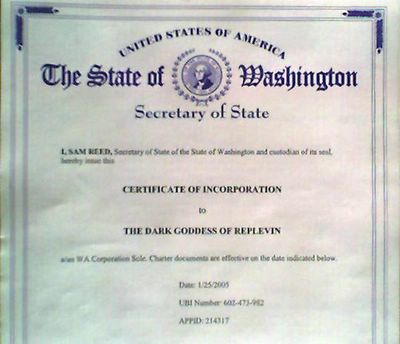I find it hard to believe that I have just used those two concepts in the same post title.
However, desperate times call for desperate measures.
My local bar association, under pressure from the local bench by means of a proposed local rule, has been busily promulgating pattern interrogatories in various subject matter areas for the last year. The pattern interrogatories will probably become mandatory, and the lawyer's ability to propound custom interrogatories will, if the proposed rule is adopted, be severely limited.
As a preliminary comment, let me say that I view any attempts to limit the number of questions I can customize to be a Bad Thing Indeed. No matter how straightforward a case appears to be, there is always some weird quirk of the case that I need to ask questions about.
Unfortunately, because future limitations appear inevitable, I made sure that I reviewed the draft family law pattern form interrogatories during the comment period.
Well.
One problem is that the committee set for itself the task of making the proposed rogs not only comprehensive for the use of attorneys, but simple for the use of pro se parties. Frankly, I think meeting both these goals at once is impossible.
When I reviewed the draft I concluded that the drafts had fallen victim to something called "literacy bias," a name I just made up for a very real phenomenon, that of overeducated lawyers who read and write for a living assuming that the general public will be able to read and write as proficiently as they. That has not been my experience. It's not that the general public is stupid, mind you (at least, no stupider than the general population of lawyers), it's just that they tend not to read as well as lawyers. In the same vein, most doctors probably do math better than the general public. And I haven't even reached the issue of the number of pro se parties who read English only as their second language. Or third. Or fourth.
In fact, a lot of people smarter than I have done research and concluded that the average American reads at about an eighth grade level. In order to be effective for use by the average pro se, therefore, the pattern interrogatories I reviewed should aim for about that level. In order to test this, I ran a snippet of text through a Dale-Chall Reading Probe. Dale-Chall, although not without its controversies and detractors, has been the most widely used and consistently valid method for estimating the difficulty of reading materials, particularly of textbooks and other educational materials, since it was published in 1948. See, e.g., Edgar Dale and Jeanne S. Chall, Readability Revisited: The New Dale-Chall Readability Formula (Brookline Books 1995).
I cranked up the Reading Probe and tested this passage:
"This certification must be completed, signed, and dated before any questions need be answered. If the Requesting Party has not signed this document, the Answering Party should bring that failure promptly to the Requesting Party's attention.
TO THE ANSWERING PARTY: The questions that must be answered are contained in the following sets where checkmarks appear in the boxes: [ ] Part A (Questions A1 to A19 - Requests for Production of Documents [ ] Part b (Questions B1 to B7) - General questions [ ] Part C."
Readability level: 11th-12th grade level.
So I took a stab at rewriting this passage, and then reran the Reading Probe (feeling more and more like a Mad Scientist all the time):
"To The Asking Party: You must complete, sign, and date this form before the other party has to answer any questions.
To the Answering Party: If the Asking Party has not signed this form, you must let him or her know as soon as possible. You must answer all the questions in any section that has a box checked."
I truly think that this rewrite fairly summarizes the instructions. Dale-Chall score? Fourth grade or below.

No comments:
Post a Comment